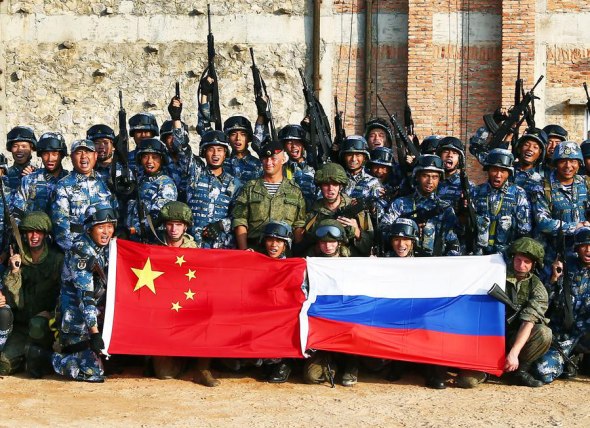
Chinese and Russian marines pose for photos during a joint naval drill in Zhanjiang, South China's Guangdong province, Sept 13, 2016. China and Russia started "Joint Sea 2016" drill off Guangdong province in the South China Sea on Tuesday. (Photo/Xinhua)
Military exchanges are taking a turn toward more frequent soldier-to-soldier communications in the ongoing China-Russia naval exercises, Chinese Senior Colonel Shi Zhigang said on Tuesday.
"In the past, China-Russia joint exercises gave much more attention to the communications between commanders of the two sides, but this time there are more programs involving the exchanges between soldiers," said Shi while training troops from both sides on day two of the eight-day China-Russia Joint Sea-2016 drill.
The drill is being held in the eastern waters off Zhanjiang, Guangdong's southernmost city, where the Chinese Navy's Nanhai Fleet is head-quartered.
Shi, who is in charge of the marines' training programs in the drill, said soldier-to-soldier communications are important to the joint exercise because the troops will cooperate better through such training.
Both countries' marines engaged in multiple exercises on Tuesday, such as shooting drills and crossing barriers in simulated beachhead fights.
Both sides' sailors underwent a damage control training program that simulated emergency leaks and fires on a warship.
It was the first time the program was included in the China-Russia naval exercises, said Lieutentant Colonel Ren Kai, a commander in charge of the damage control training.
"Damage-control training is important because what the crews learn about fighting leaks and fires can give warships a second life," he said.
For the first time in the five years of the annual drills, the China-Russia joint naval exercises are being held in the South China Sea. Last year, they were conducted in the Mediterranean in May and in the Sea of Japan in late August.
Shi, leader of the marines' drills, said that the international community should not read too much into the site of exercises.
"The two navies have already carried out drills in the country's North and East seas, and it's natural that we should have exercises in the South China Sea," he said.
Shi added that it was the duty of China's military to protect "every inch of national territory".
Sergey Shimankin, a Russian marines' commander, said he hoped Russian troops would hone their combat abilities through the joint exercise.
He spoke highly of the Chinese marines' training and said he expected both sides would cooperate better because of the joint operations.


















































